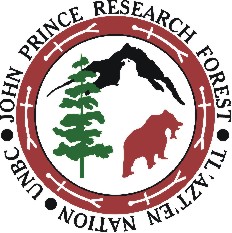Study Area: John Prince Research Forest
 |
A forest co-managed by Tl'azt'en Nation and the University of Northern BC
The
John Prince Research Forest (JPRF) is jointly managed by Tl'azt'en
Nation and the University of Northern British Columbia (UNBC) as a research
and educational facility.
The broad objective of this partnership is to combine scientific and indigenous
approaches to land management that integrate and enhance multiple resource
values, and contribute to the ecological and social stability of the region.
By
creating an outdoor laboratory and facility, Tl'azt'en and UNBC seek to
provide a natural setting for forest resource research, education and
demonstration. Through its projects and programs, the JPRF integrates
community development as a part of its approach to sustainable forest
management.
Forest management on the JPRF is regulated through provincial forest legislation and tenured through a Special Use Permit. The JPRF tenure requires that the forest be co-managed by the partners.
The
JPRF is a working forest. Annually, approximately 13,000 m3 of timber
(~45ha) is harvested from its 13,000 ha landbase, and is sold on the open
market. The revenues from the sale of the logs provide the primary funding
for JPRF programs. The management activities associated with harvesting
and subsequent reforestation activities provide a setting for research.
Forest operations and milling of timber contribute to local employment.
In 2002, the Cinnabar Resort on Tezzeron Lake was purchased for the JPRF.
The facility provides accommodation for students and researcher, tourists,
as well as a site for educational programs. The resort is popular for
camping, fishing and hunting. So far, there are 22 km of hiking trails,
and interpretive programs are being developed.
The JPRF operates as a research facility for researchers, and also has an internal research program. There are a range of research opportunities at the JPRF, including forestry operations; wildlife; recreation and tourism; environmental, social, cultural, and community studies. On-going research projects include integrating traditional knowledge into forest management, the historical forest restoration project, and criteria and indicators of co-management. More work is planned for baseline inventories, ecological restoration, beetle-proofing, and mixedwood trials. The CURA project will contribute greatly to both research and education on the JPRF.
The
goal of the education and training programs is to help create future natural
resource managers and community leaders. For UNBC students, the JPRF hosts
the Forestry Field Camp and field trips for other students, including
recreation, geography, forestry, fish and wildlife, and planning classes.
There are also opportunities for student work experience and volunteering.
For Tl'azt'enne, the JPRF has run culture and science camps, and arranged
school field trips. Staff have also given class presentations in schools.
Training programs focus on capacity building through employment, work
experience programs, and volunteer opportunities. One highly successful
program is helping Tl'azt'enne youth build skills through the Recreational
Trail Network and Interpretive Program.
To manage the JPRF, Tl'azt'en Nation and UNBC created a non-profit company called Chuzghun Resources Corporation (CRC).
This company is owned equally by Tl'azt'en Nation and UNBC and is managed through a Board of Directors. Each partner appoints their representatives. The Board of Directors provide strategic direction for the business and programs of the JPRF, and oversee its financial management and forest operations. Profit is reinvested in JPRF programs, services, activities and facilities.
An external Advisory Committee made up of representatives from government agencies, regional districts, forest industry and other local First Nations provide oversight and input into the research and educational programs.
© Tl'azt'en Nation and the University of Northern BC CURA - Partnering for Sustainable Resource Management, 2005
For more information or comments on the website, please contact Sarah Parsons, Research Coordinator